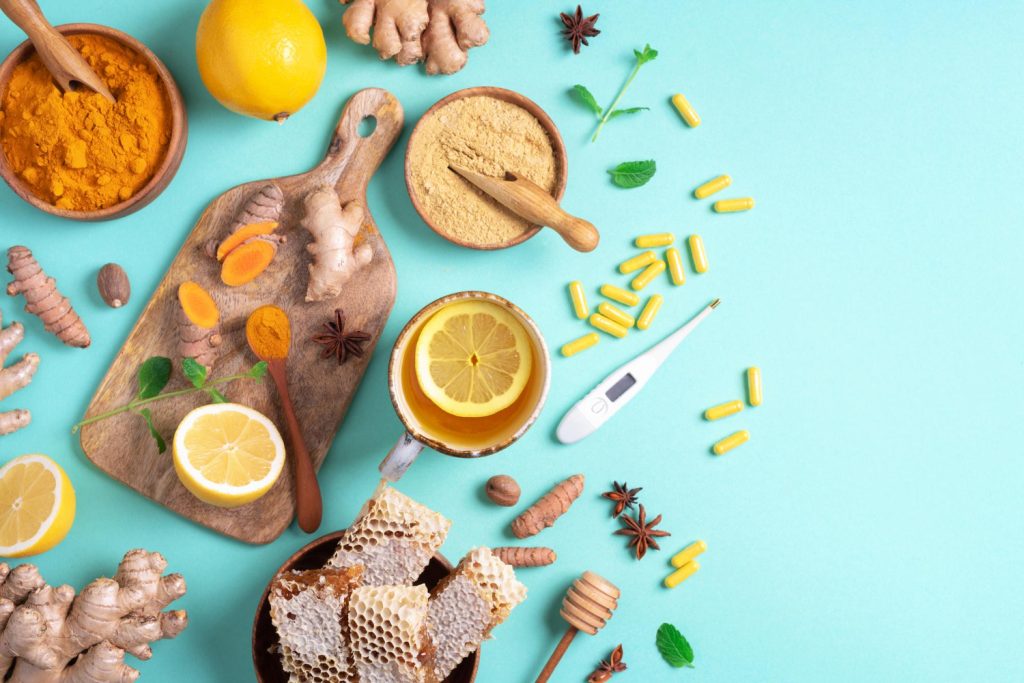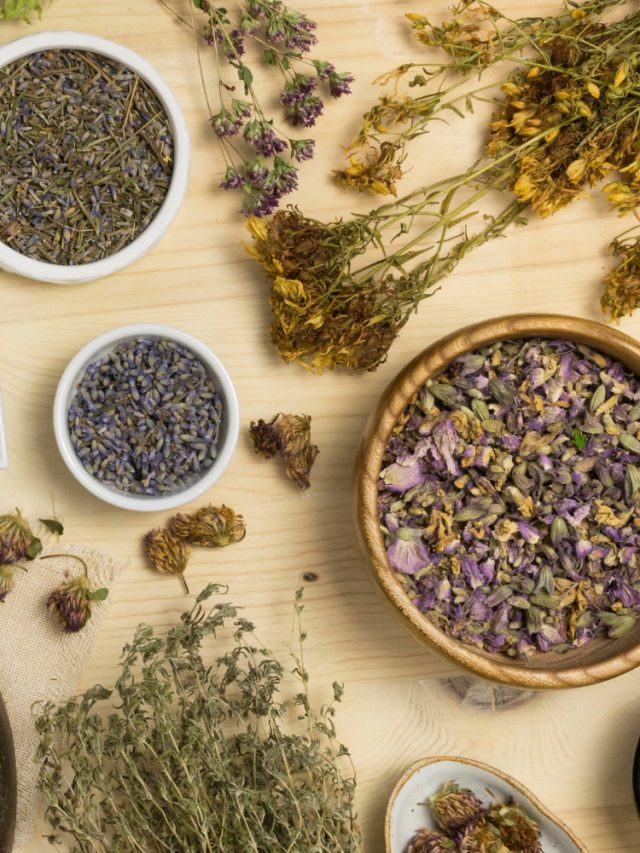
In today’s fast-paced world, maintaining a robust immune system is more crucial than ever. Ayurveda, the ancient Indian system of medicine, offers a holistic approach to health and well-being. Harnessing the power of nature, Ayurvedic herbs have been revered for centuries for their immune-strengthening properties. Let’s explore six Ayurvedic herbs that can help fortify your immunity and promote overall health.
Empower your immune system with our specialized range – your pathway to a stronger, healthier you. Explore our immune-enhancing products now!
1. Ashwagandha
Ashwagandha also known as the Indian Ginseng is one of the most common and important herbs of Ayurvedic medicine owing to its wide range of health benefits. It is used as a “rasayana” or herbal tonic from kids to the elderly to enhance immunity and increase longevity. This popular herb improves the body’s defense against harmful pathogens by improving cell-mediated immunity. It also possesses antioxidant properties that also protect against cell damage caused by free radicals. Moreover, it also reduces the level of a stress hormone called cortisol thereby alleviating stress.
How to have:
-Take 1/4-1/2 teaspoon of Ashwagandha root powder (Churna) and boil it in 2 cups of water.
-Add a pinch of ginger and boil till it reduces to half. Cool the mixture and add honey to enhance its taste.
-Ashwagandha is also available in the form of syrup (Ashwagandharishta) and ashwagandha capsules.
Arm yourself against winter ailments! Elevate your immunity with our premium Ashwagandha supplements.
2. Giloy
Giloy or Guduchi is traditionally used in a wide variety of conditions for its combination of anti-oxidant, anti-inflammatory, immune-modulating, and liver-supportive actions. It is useful in building up the immune system and the body’s defense against infections. It enhances the activity of macrophages (the cells responsible for fighting foreign bodies as well as microorganisms) and thus helps in early recovery. It is also an anti-inflammatory and antipyretic (that reduces fever) herb. Giloy produces its anti-inflammatory effect by blocking the effect of inflammatory chemicals like histamine and bradykinin. This helps in controlling non-specific allergic reactions in the body.
How to have:
-Take 2-3 teaspoons of Giloy juice. Add the same quantity of water to it and drink it on an empty stomach in the morning once daily.
-You could have Giloy in the form of Giloy syrup (Amritarista), Giloy capsule, or Giloy extract (satva).
Strengthen your immunity with our exclusive range of Giloy supplements.
3. Amla
Amla is a rich source of vitamin C, B complex and antioxidants. These nutrients flush harmful toxins from the body and help fight the harmful free radicals. The presence of anti-inflammatory compounds in amla helps in lowering the levels of inflammation in the body and thus, preventing infections. It also contains immune-enhancing properties, which have a regenerative effect on the immune system and help fight infections better.
How to have:
-Starting your day with amla, whether consumed in its raw form or as a refreshing juice, can reduce your susceptibility to diseases and contribute to maintaining overall health.
-For kids, amla in the form of murabba (amla boiled with jaggery ) or Chywanprash can be used as a spread over rotis or bread, which might help them reap the immune-strengthening properties.
-Amla is readily available as Chyawanprash, Amla juice, Amla candy, Amlaki Capsules, and Amla murabba.
If you are looking for a concoction of herbs to ward off cold and cough this winter, incorporate 1-2 teaspoonfuls of Chyawanprash daily. Look for the Chyawanprash that suits you the best.
4. Tulsi
Tulsi has long been known as a plant loaded with medicinal properties. Well, this could be the reason why this plant is seen in many Indian households. It is rich in essential oils that are beneficial for the nervous system, immune system, and the antioxidant system. The antioxidant effect of tulsi protects all organs of the body from oxidative damage. These leaves act as an immunomodulator which means they play a key role in improving, maintaining, and boosting the production of antibodies and prevention of infections.
How to have:
-You can start your day with a glass of tulsi tea. To make this at home, add 3-4 tulsi leaves to a glass of boiling water. Let it simmer for a few minutes.
-Have this drink 2-3 times a day.
-Tulsi is also commercially available in the form of tulsi patra churna (leaf powder), Tulsi beej Churna (seed powder), and Tulsi Panchang juice.
Elevate your defense against infections with Dabur’s immune-enhancing products – your key to a healthier, resilient life. Shop now and fortify your well-being!
5. Mulethi
According to Ayurveda, Mulethi or licorice helps to fight infections by improving immunity due to its Rasayana (rejuvenating) property. Mulethi contains antimicrobial agents that detect and attack unwanted bacteria and germs, protecting you from sickness. The antimicrobial agent is called glycyrrhizin, which inhibits the growth of harmful microbes, further protecting you from diseases and infection. The enzymes present in the roots of the Licorice plant help in the production of lymphocytes and macrophages which are the body’s natural defense against microbes, pollutants, and allergens.
How to have:
-Crush 10 grams of dried licorice plant roots and mix with 200 grams of tea leaves. Use this mix to make your everyday chai.
-Mulethi is also available in the form of Mulethi churna and Mulethi capsules.
6. Turmeric
The active compound in turmeric, curcumin, is known for its potent anti-inflammatory and antioxidant effects. These properties support the immune system by promoting a healthy inflammatory response. Including turmeric in your diet or opting for curcumin supplements can be a valuable addition to your immune-enhancing arsenal.
How to take:
-Increase your immunity by adding a pinch of turmeric to your daily meals or enjoying warm turmeric-infused milk before going to bed at night.
(The article is written by Monalisa Deka, Senior Health Content Editor)
